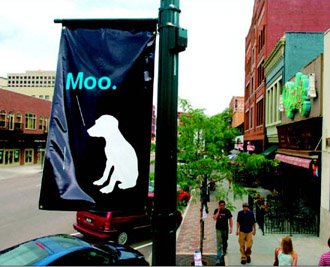 COLORADO SPRINGS, COLORADO - For the past two weeks, pedestrians in downtown Colorado Springs have been strolling past gay-rights signs and posters, probably without even knowing it.
COLORADO SPRINGS, COLORADO - For the past two weeks, pedestrians in downtown Colorado Springs have been strolling past gay-rights signs and posters, probably without even knowing it.A puppy named Norman who says “moo” instead of “woof” is the star of an advertising campaign targeting Colorado Springs. On television, the ads say Norman can’t help acting like a cow, he was just born different.
The downtown signs, though, are more cryptic, showing only Norman and the word moo.
But backers of the ad campaign said Norman’s story is a metaphor for gay people. They argue everyone is born with a sexual orientation.
An online presentation at www. borndifferent.org raises a question for doubters: “When did you decide to be straight?”
The Denver-based Gill Foundation spent $900,000 on the campaign, which includes television ads, billboards and banners over downtown streets. It began in early June and will continue through early August.
The ads are only in Colorado Springs, which, organizers say, has a reputation for being hostile to homosexuals. The reputation dates back at least 14 years to a state constitutional amendment Colorado voters approved banning protected status for gays. The amendment’s backers were based here. The U.S. Supreme Court struck down the amendment in 1996.
Colorado Springs also is home to the Christian ministry Focus on the Family, which has drawn criticism from gay activists nationally for its position that “homosexuality is preventable and treatable.”
“The Springs are seen nationally as a battleground of social issues,” said Bobby Rauzon, a spokesman for the ad campaign.
Many of the advertisements do not directly address sexuality. The street banners, for example, feature only the silhouette of Norman and the word moo. That message didn’t reach Eddie Cheesman, a Colorado Springs resident who has seen the banners from his job at a club on Tejon Street. Cheesman said he’s also seen the TV commercials, and recently several people were downtown handing out napkins printed with the dog image and Web site address.
“I haven’t actually been online to see it, but I’ve seen the commercials, and I guess it’s about equality,” he said. “I kind of thought, ‘What do you mean different? Do you mean like another limb or something?’ I mean, everybody’s born different.”
Rauzon said advertising designers deliberately took a soft approach.
“It was definitely designed to get people talking, wondering, asking questions about what is this,” he said. “It’s friendly, and it’s not heavyhanded, and it’s designed just to get people talking,” he said.
The campaign Web site points readers to a news release from the University of East London on research released last year that found 2 percent to 4 percent of people are born gay. It also notes homosexuality in the animal kingdom and says it’s impossible for gays to change their sexuality.
The idea isn’t to offer conclusive scientific proof one way or the other but to stimulate discussion, said Mary Lou Makepeace, director of the Gay & Lesbian Fund for Colorado, which is based in Colorado Springs. The fund is a project of the Gill Foundation.
“I think we have kind of an unfair label as an intolerant community, and yet we don’t really ever talk about things around here in a community way,” said Makepeace, who is also the former city mayor. “We have this reputation, and whether it’s fair or unfair, we still have it, and we need to deal with it.”
Even if the ads aren’t supposed to start technical, scientific discussions, a psychologist for Focus on the Family said the campaign gives the false impression of a consensus among experts. Bill Maier, vice president and psychologist in residence at Focus, said scientists have reached no conclusions on a biological basis for homosexuality.
Maier said he suspects the campaign is a cloaked effort to advance political agendas such as legal gay marriage.
“What saddens me the most about this is that gays and lesbians themselves are being kept in the dark about the true nature of sexuality,” he said.
Makepeace said she just wants to spark discussions, not tell people what to think.
“There is so little community dialogue in Colorado Springs that I would just enjoy people over drinks or coffee or dinner saying, ‘What do you think?’” she said.
from The Colorado Springs Gazette
No comments:
Post a Comment